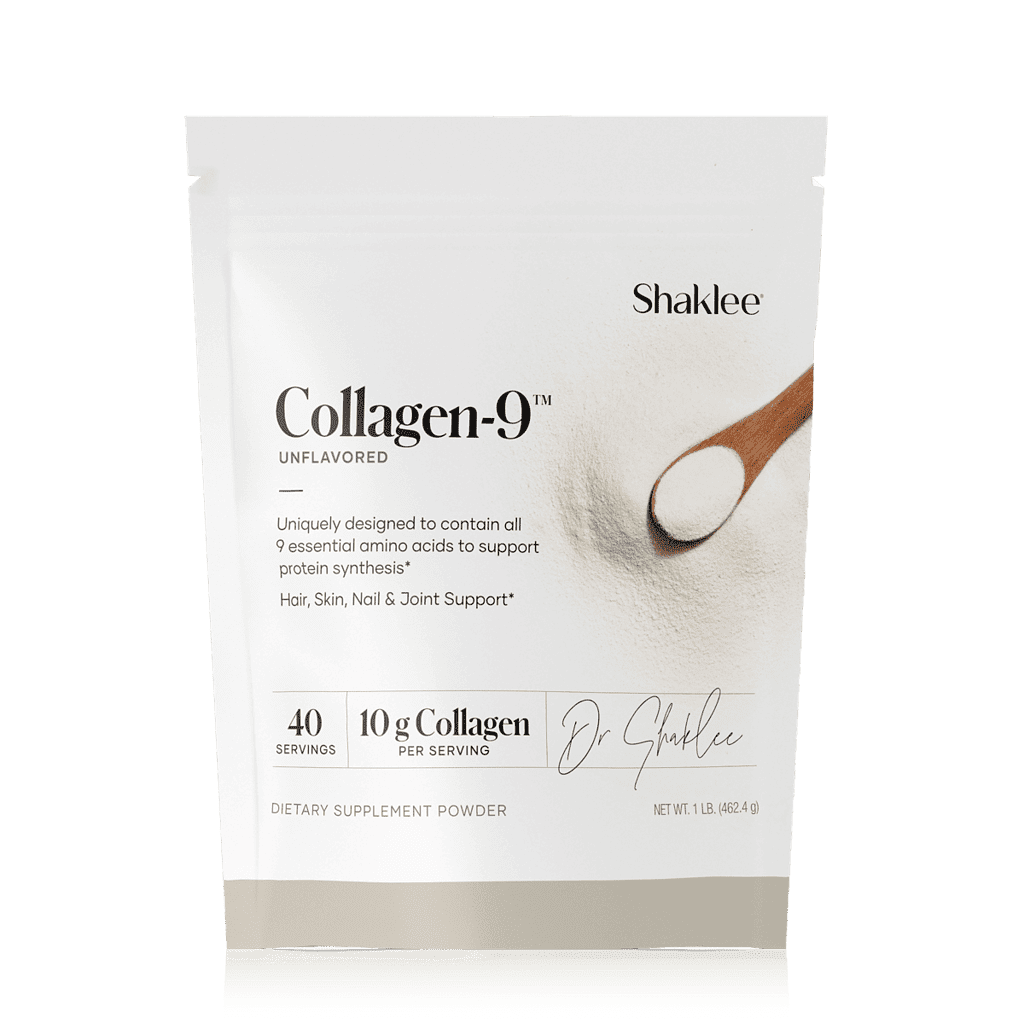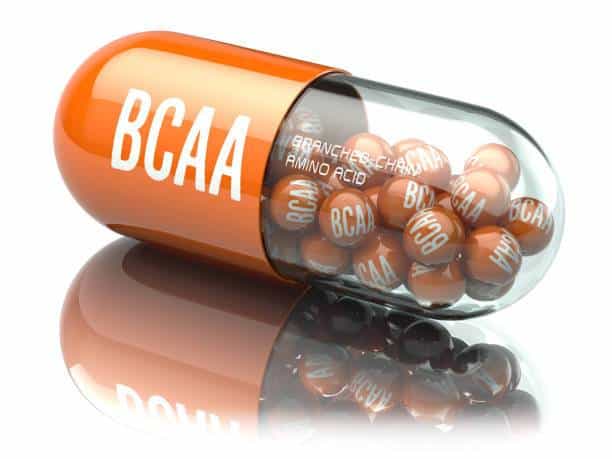Revised October 21, 2023
Regarding protein supplements, BCAAs (Branched-Chain Amino Acids) and collagen stand out as two top contenders in today’s market. Both come packed with essential amino acids vital for numerous bodily functions. However, their primary roles and benefits diverge, making them more apt for distinct health objectives and concerns.
This article aims to shed light on these differences, taking you on a detailed journey through the worlds of BCAAs and collagen. By understanding their strengths and their physiological benefits, you’ll be better equipped to make an informed choice about which supplement aligns best with your personal health goals.
BCAAs: What Are They and How Do They Work?
Branched-chain amino acids, or BCAAs, are a group of three essential amino acids – leucine, isoleucine, and valine. They are “branched-chain” because of their unique molecular structure. This sets them apart from other amino acids.
BCAAs play a crucial role in muscle protein synthesis. This is the process by which the body builds new muscle tissue. They also play a role in reducing muscle soreness and promoting muscle recovery after exercise.
Research has shown that BCAAs can improve exercise performance by delaying fatigue and reducing muscle damage. This makes them particularly popular among athletes and fitness enthusiasts who exercise intensely.

BCAAs are in protein-rich foods such as meat, poultry, fish, and eggs. However, many people supplement with BCAAs to ensure they get enough of these essential amino acids.
Health Benefits of BCAAs
- Muscle protein synthesis. BCAAs play a crucial role in muscle protein synthesis. Research has shown that supplementing with BCAAs can increase muscle protein synthesis and promote muscle growth.
- Muscle recovery. BCAAs may also help to reduce muscle soreness and promote muscle recovery after exercise. Research has shown that supplementing with BCAAs can decrease muscle soreness and improve muscle recovery after resistance training.
- Exercise performance. BCAAs can also improve exercise performance by delaying fatigue and reducing muscle damage. This can be particularly beneficial for athletes and fitness enthusiasts who exercise intensely.
- Weight loss. BCAAs may also be beneficial for individuals who are trying to lose weight. Some studies have suggested that supplementing with BCAAs can reduce body fat. It can also increase lean muscle mass, which may help to support weight loss efforts.
- Blood sugar control. BCAAs may also help to improve blood sugar control in individuals with type 2 diabetes. Some studies have shown that supplementing with BCAAs can improve insulin sensitivity and reduce blood sugar levels in individuals with type 2 diabetes.
- Immune function. BCAAs may also play a role in immune function by supporting the production of immune cells. Some studies have suggested that supplementing with BCAAs can improve immune function and reduce the risk of infections.
Collagen: What Is It and How Does It Work?
Collagen is a protein throughout the body, particularly in connective tissues such as skin, tendons, and ligaments. It comprises several amino acids, including glycine, proline, and hydroxyproline.
Collagen supplements help to support skin health, joint function, and the appearance of hair and nails. Collagen is also an important component of bone tissue and can help improve bone density in postmenopausal women.
One of the unique properties of collagen is its ability to form a gel-like substance when mixed with water. This makes it a popular ingredient in soups, stews, and broths recipes.

Collagen supplements come in various forms, including powders, capsules, and gummies. Some collagen supplements, such as bovine or marine collagen, come from animal sources. Whereas others are plant-based, which are more suitable for vegans or vegetarians.
Health Benefits of Collagen
- Skin health. Collagen is a major component of the skin and plays a crucial role in maintaining skin health and appearance. As we age, our body’s natural collagen production decreases, leading to wrinkles, sagging skin, and other signs of aging. Collagen supplements may help to counteract these effects by providing the body with the amino acids it needs to support healthy skin.
- Joint health. Collagen is also a major component of connective tissues, such as cartilage, which helps to cushion and support the joints. Research has shown that supplementing with collagen may help to reduce joint pain and stiffness in individuals with osteoarthritis.
- Bone density. Collagen is also an important component of bone tissue and may help improve bone density in postmenopausal women. Some studies have suggested that supplementing with collagen may help to reduce the risk of fractures and other bone-related injuries.
- Hair and nail health. Collagen supplements may also help to support the appearance of hair and nails. Some research has shown that collagen supplements may improve nail growth and strength, reduce hair loss, and promote hair growth.
- Gut health. Collagen may also have benefits for gut health. Collagen contains the amino acid glycine, which improves gut health by reducing inflammation and promoting the growth of beneficial gut bacteria.
- Heart health. Collagen may also have benefits for heart health. Some studies have suggested that collagen supplements may help to reduce the risk of heart disease by improving cholesterol levels and reducing inflammation.

Differences Between BCAAs and Collagen
BCAAs and collagen have distinct differences that make them suitable for different purposes. One of the primary differences is their amino acid composition. BCAAs contain only three essential amino acids. On the other hand, collagen is a more complex protein that contains a wider range of amino acids, including non-essential amino acids.
BCAAs are particularly popular among athletes and fitness enthusiasts looking to build muscle or reduce muscle soreness. Collagen, on the other hand, is best for its potential benefits to skin and joint health.
BCAAs are typically taken before or after exercise to support muscle recovery and reduce muscle soreness. Conversely, Collagen is often taken daily as a long-term supplement to support overall skin and joint health.
Who Should Take BCAAs?
BCAAs are often recommended for athletes and fitness enthusiasts who exercise intensely. They may help promote muscle protein synthesis and reduce muscle soreness. They may also benefit individuals trying to build muscle mass or maintain muscle during weight loss.

BCAAs are sometimes used in clinical settings to support muscle protein synthesis in patients recovering from burns or other injuries.
Who Should Take Collagen?
Collagen supplements may benefit individuals looking to support their skin health, joint function, or the appearance of their hair and nails. They may also be useful for individuals experiencing joint pain or stiffness.
As we age, our body’s natural collagen production decreases, leading to wrinkles, sagging skin, and joint pain. Collagen supplements may help to counteract these effects by providing the body with the amino acids it needs to support healthy skin and joints.
Collagen supplements are also commonly used in beauty and skincare products. Some research suggests collagen supplements may improve skin elasticity and hydration and reduce wrinkles’ appearance.
Collagen and BCAAs for People Over 40
Our body’s natural collagen production decreases as we age, leading to wrinkles, sagging skin, and joint pain. Collagen supplements may help to counteract these effects by providing the body with the amino acids it needs to support healthy skin and joints.
In addition, collagen supplements may also help to improve bone density in postmenopausal women, which can help to reduce the risk of fractures and other bone-related injuries.
Research has also shown that collagen supplements may improve skin elasticity and hydration and reduce the appearance of wrinkles. This can be particularly beneficial for individuals over 40 who may be experiencing age-related changes in their skin.

BCAAs, on the other hand, can help to support muscle mass and function in older adults. Our muscle mass decreases as we age, leading to various health problems, including an increased risk of falls and fractures.
However, research has shown that supplementing with BCAAs can help preserve muscle mass and improve muscle function in older adults. This can be particularly beneficial for individuals over 40 experiencing age-related muscle mass and function declines.
In addition, BCAAs may also help to improve cognitive function in older adults. Some studies have suggested that BCAAs may improve memory and learning abilities in older adults and reduce the risk of cognitive decline.
Overall, both collagen and BCAAs can be beneficial for individuals over the age of 40. Collagen supplements may help to support healthy skin, joints, and bones, while BCAAs can help preserve muscle mass and improve cognitive function.
How to Choose Between BCAAs and Collagen
When deciding between BCAAs and collagen, it’s important to consider your individual health goals and concerns. If you’re an athlete or fitness enthusiast looking to build muscle or reduce muscle soreness, BCAAs may be the better option.
Protein may suit you if you want to support your skin health, joint function, or the appearance of your hair and nails. Collagen supplements may also be useful for individuals experiencing joint pain or stiffness.

It’s also worth noting that both BCAAs and collagen can be taken together as part of a comprehensive supplement regimen. Combining BCAAs and collagen may provide additional benefits for overall health and wellness.
Final Thoughts
In conclusion, BCAAs and collagen are popular protein supplements that provide the body with essential amino acids. However, they serve different purposes and may be more suitable for specific health goals or concerns.
BCAAs are often recommended for athletes and fitness enthusiasts who are looking to build muscle or reduce muscle soreness, while collagen supplements may be beneficial for individuals who are looking to support their skin health, joint function, or the appearance of their hair and nails.
Ultimately, the best supplement for you will depend on your individual health goals and concerns. By understanding the differences between BCAAs and collagen, you can decide which one best fits your needs.



